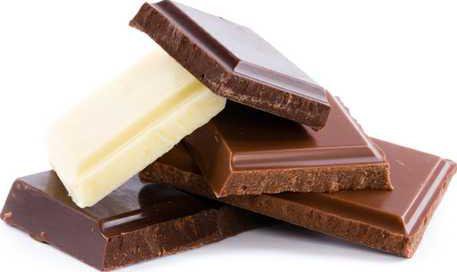Dont feel bad if you prefer milk over dark a new study says that any kind of chocolate is incredibly good for your health.
Dark chocolate has been lauded for years as the smarter choice when it comes to eating candy, but this new study, published in the journal Heart, suggests there might not be a big difference after all.
The study looked at health data from over 21,000 men and women for almost 12 years. Researchers from the University of Aberdeen in England found that the participants who consumed the most chocolate had an 11 percent lower risk for coronary heart disease and a 23 percent reduced risk for stroke.
There does not appear to be any evidence to say that chocolate should be avoided in those who are concerned about cardiovascular risk, the researchers wrote in their conclusion.
This is the first study that shows that milk chocolate can be beneficial to the heart. Previous studies have shown that dark chocolate can cut the risk of heart failure in women by a third.
Scientists arent exactly sure what component of the chocolate is good for your health. Dr. Phyo Myint, senior author of the study, told Live Science that flavonols found in chocolate could contribute to the risk reduction of heart disease and stroke.
But, Myint warns, make sure you keep your chocolate indulgence to 3.5 ounces or less.
"The key is only to have moderate consumption and ensure one does not exceed the calorie intake recommended for their height or weight," Myint said.
This study comes on the heels of another cocoa study that says dark chocolate may contain more milk than previously thought. A 2013 study showed that drinking hot chocolate twice a day appeared to boost blood flow to the brain by 8.3 percent, improving brain function and memory.
Healthy ways to add chocolate to your diet
If it's too hard on your diet to keep a bag of candy around the house, try one of these alternatives:
Dark chocolate has been lauded for years as the smarter choice when it comes to eating candy, but this new study, published in the journal Heart, suggests there might not be a big difference after all.
The study looked at health data from over 21,000 men and women for almost 12 years. Researchers from the University of Aberdeen in England found that the participants who consumed the most chocolate had an 11 percent lower risk for coronary heart disease and a 23 percent reduced risk for stroke.
There does not appear to be any evidence to say that chocolate should be avoided in those who are concerned about cardiovascular risk, the researchers wrote in their conclusion.
This is the first study that shows that milk chocolate can be beneficial to the heart. Previous studies have shown that dark chocolate can cut the risk of heart failure in women by a third.
Scientists arent exactly sure what component of the chocolate is good for your health. Dr. Phyo Myint, senior author of the study, told Live Science that flavonols found in chocolate could contribute to the risk reduction of heart disease and stroke.
But, Myint warns, make sure you keep your chocolate indulgence to 3.5 ounces or less.
"The key is only to have moderate consumption and ensure one does not exceed the calorie intake recommended for their height or weight," Myint said.
This study comes on the heels of another cocoa study that says dark chocolate may contain more milk than previously thought. A 2013 study showed that drinking hot chocolate twice a day appeared to boost blood flow to the brain by 8.3 percent, improving brain function and memory.
Healthy ways to add chocolate to your diet
If it's too hard on your diet to keep a bag of candy around the house, try one of these alternatives:
- A cup of hot chocolate: 113 calories, 1.1 grams of fat, 18.6 grams of sugar
- An ounce of chocolate: 151 calories, 9 grams of fat, 7 grams of sugar
- A handful of semi-sweet (or milk!) chocolate chips ( of a cup): 80 calories, 4 grams of fat, 9 grams of sugar








